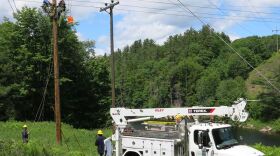Rural towns in New Hampshire have long struggled to keep up with the demand for access to broadband in their communities.
Liisa Rajala is the associate editor for New Hampshire Business Review, and she's been reporting on how rural communities have had to take expanding broadband access into their own hands.
She spoke with NHPR's Morning Edition Host Rick Ganley.
(Below is a transcript from the NHPR interview.)
Liisa, why is it so difficult for rural communities in New Hampshire to get the broadband access they'd like?
It really comes down to industry economics. So in urban areas, there's a higher concentration of consumers that are paying for the broadband network and its upkeep. Whereas in rural areas where you have dispersed populations, there's not only fewer consumers, but there's greater distance between houses and businesses and that sort of thing. So it really makes it more expensive for Internet service providers.
Might this also limit some towns though from attracting businesses and younger people and families? I mean if you don't have broadband access these days, it must be awful hard to get people to come.
Oh certainly, one of the concerns is whether that might eventually affect property taxes. Because today when people are looking for homes, they're looking for broadband access, especially as more people are working out of their homes or working remotely sometimes.
Can you talk a bit about SB 170? This is the bill that lawmakers in New Hampshire passed to try and help the situation.
SB 170 allows municipalities to issue long term bonds to build broadband infrastructure according to the FCC's definition of broadband, which is 25 Mbps download speed and 3 Mbps upload speed. And this allows municipalities to issue a request for information from their Internet service providers to see what areas of the town do not have broadband capability or accessibility, and then they can issue a request for proposal and partner with an Internet service provider to build out broadband in their community.
It's a public-private partnership in order to get broadband to those areas that just don't have it.
Yes absolutely.
And have any towns taken advantage of this so far? Have you seen any new partnerships?
Yes, Chesterfield has acted pretty quickly. They'd already been looking at this issue. So when SB 170 was passed, they partnered with Consolidated Communications to build fiber to the premise, to actually the entire community. And they have really been highlighted as the prime example of a community taking advantage of this bill.
In your reporting, you found the Chesterfield is a bit of an anomaly though because it's not like some other towns. Why is Chesterfield different than some other towns, and why can't other towns do what Chesterfield has done?
Well, Chesterfield is unique because Consolidated [Communications] has agreed to build out fiber to the premise, to the entire town and not just the 18 percent that do not have broadband accessibility. Consolidated [Communications] also found that in evaluating Chesterfield's geographical area and logistics, that the cost difference to build out say copper wire DSL technology versus fiber to the premise was only a difference of $300,000. So they are going to foot that bill in addition to the $2.5 million they're putting towards the project.
But they're now finding that there are several other towns that are reaching out to them looking to copy this model, and that may not be available to them depending on the logistics of the area.
And building out fiber optics right to each individual premise is generally much more expensive to do in towns that don't have any of it, correct?
Yes, and especially in areas where you have greater distance between the homes, it's more fiber that you have to lay down. So that makes it more expensive.
Yeah, the more rural, the more expensive it is. A lot of these communities as you said, do want to build out a full fiber network. Why is it important for them to have that now?
Fiber provides faster and more reliable speeds, whereas copper technology will degrade over time. When I talked to residents in Dublin, they told me they often have issues where they're trying to upload files, say photo files or graphics, and they will have outages or slower speeds that prevent them from continuing to do their work. When I spoke with Brie Morrissey, she's at Dublin Village Park which is one of the few locations in Dublin that has fiber access because they've built it themselves, she told me that it really was a life changing experience to use fiber, especially as she uses products like Adobe that were traditionally computer software products but now are becoming cloud-based services. You need that level of connectivity.
And that's so important of course. If you're trying to attract business to your town, you're going to need fiber. You're going to need that kind of speed and reliability. What about federal or state funding for this? It seems like these towns are having to take this issue into their own hands.
There is some federal funding, but the problem is some towns do not meet these minimum requirements or do not meet certain requirements. Forty percent of the population of Hanover does not have access to broadband, but its median income is higher than the requirements for say for instance a community block development grant. So that really limits a lot of communities in the state of New Hampshire from applying for these federal grants. Though there are some efforts underway to look at, for instance USDA grants, or whether they could expand the number of applications that are allowed.
This isn't a New Hampshire specific problem of course. Are there any other states that you've looked at who've had success in partnering with communications companies directly?
Yes. Speaking to a couple people in New Hampshire who have been very focused on broadband build out, they point to Vermont as an example of success because Vermont has a staffed broadband authority that can then collect cable and Internet service providers franchise fees in order to then dole out grants to specific areas of the state where they can build out broadband. And they've had success working with EC Fiber in the eastern part of the state.
So looking ahead here in New Hampshire, are there towns where there are projects in the works now?
Yes beyond Chesterfield, Dublin is in the process of soon releasing a request for proposal, and they have heard from a company that is outside of the state that might be interested in bidding on that. As well as the town of Lyme, they have a group of private investors that are now working with EC Fiber, which is out of Vermont. So it's interesting because since SB 170 has passed, there are some companies from outside of the state that are looking to partner with communities, which could bring increased competition to the state.








